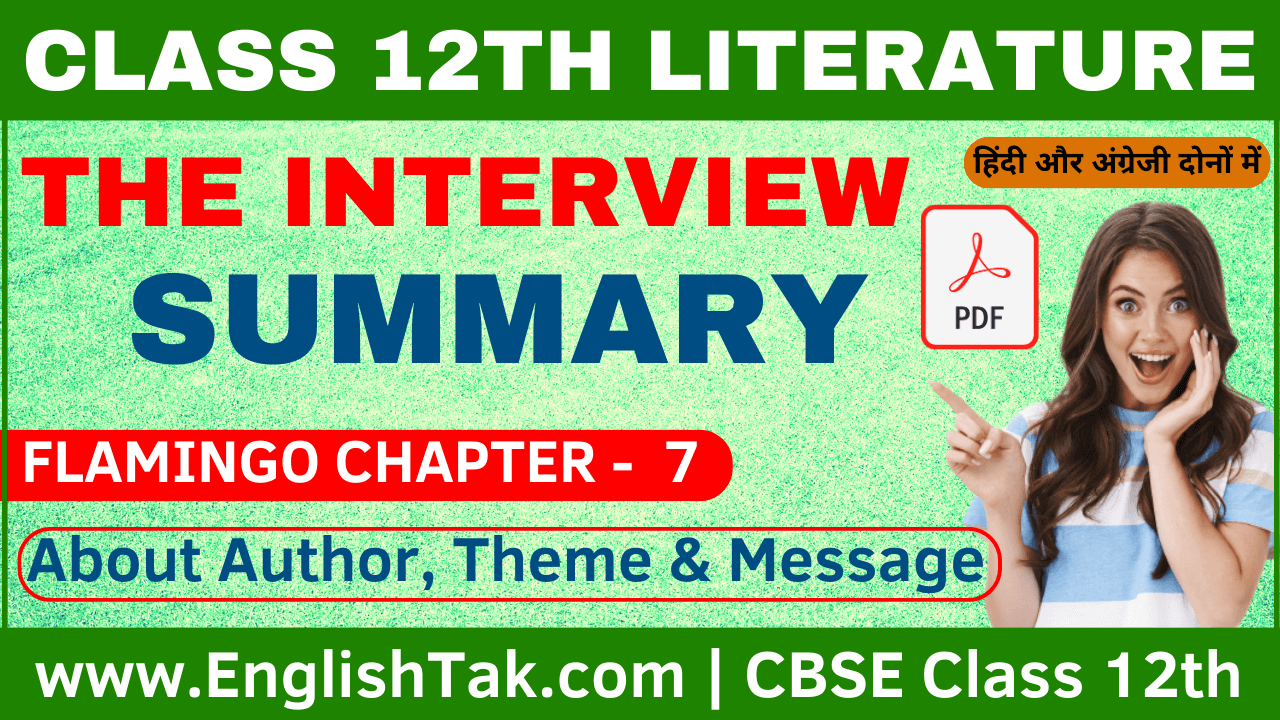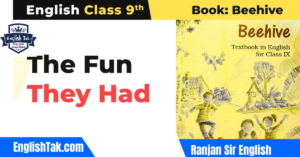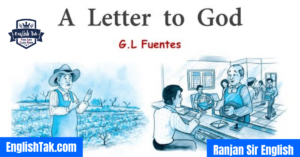![]()
The Interview Summary Class 12 English
Table of Contents
The Interview Summary Class 12 English – EnglishTak.com has offered a brief overview of the class 12 interview. They provide a summary of the interview chapter in both English and Hindi, including questions and answers related to the chapter. They also offer a downloadable PDF for class 12 students studying the interview chapter, encompassing important and extra questions with answers.
The Interview Summary Class 12
The Interview
—Christopher Silvester
The Interview About the Author
Christopher Silvester (1959) was educated at Lancing College Sussex, and Peter House, Cambridge, where he read history. From 1983 to 1994, he worked for Private Eye, initially writing the ‘New Boys’ column. He has written for several newspapers and magazines. He is also the Editor of The Penguin Book of Interviews: An Anthology from 1859 to the Present
Day and the author of The Pimlico Companion to Parliament. He currently writes obituaries for the Times (of London) and book reviews. He is writing a three-volume social history of Hollywood for Pantheon Books.
Theme of The Interview
‘The Interview’ written by Christopher Silvester briefs the new invention ‘Interview’ in the field of journalism. Interview that was invented over 130 years has become a commonplace journalism. Today, every literate or illiterate will have to experience interview at some points of their life.
It is surprising to notice that as an interviewer, each one is comfortable, whereas as an interviewee, they feel it much disturbing and diminishing.
Justification of the Title
The title ‘The Interview’ is appropriate as it is the heart and soul of the lesson. The pros and cons of the interview are discussed with apt examples in the first part. The part II talks about interview of Umberto Eco who has acquired the sobriquet of intellectual superstardom with the publication of ‘The Name of the Rose’.
He was a professor who had earned his name and fame in his field. He talked about his satisfaction and achievement in his writing. He also revealed that he wrote in interstices. He was not like his friend Roland Barthes. He openly admitted that his success in the novel, The Name of the Rose depended on the timing of its publication.
Message of The Interview Poem
“The Interview” deals with the importance of interview as essential part of literature. With time its advent is more acceptable in journalism. However, the impact and opinion may vary considerably about its function. The interview of Umberto Eco has helped him earn his name as a writer.
Moreover he has tried to convince the readers that some interview becomes the source of inspiration for them.
The Interview Summary Class 12 English
Class 12th Writing Skills Pdf
The Interview Summary Part I
Meetings are typical nowadays. The individuals who see meets emphatically think of them as a wellspring of truth and workmanship. Among the antagonistic perspectives on interviews is the supposition that they are an undesirable, unjustifiable, and superfluous interruption and attack into a man’s private life; they leave individuals injured and destroyed. There are some who have even portrayed meetings as an experience and a thumbprint on their windpipe.
Yet, in the advanced world, interviews are a remarkably workable vehicle of correspondence and help to make impressions of our peers. The questioner holds a ground-breaking position and impact.
The Interview Summary Class 12 English
The Interview Summary Part II
It is a passage from a meeting of Prof. Umberto Eco. In his meeting with Mukund Padmanabhan, Umberto discusses his inclinations, his style, and the accomplishment of The Name of the Rose. He says that his central advantages are philosophical and moral, and these are likewise the prevailing subjects of his scholastic work and books. Indeed, even his books for youngsters are about peacefulness and harmony.
He says that there is a perky and individual quality in his works, which is an embraced one. He found his style when he presented his doctoral theory. His theory recounted an account of his examination, his preliminaries, and blunders. He, at that point, created his preference for portrayal.
Henceforth his scholarly works are not dry and exhausting. He explains how he uses even the briefest holes in the middle of two unique bits of errand that give others a fallacious impression that he is doing endless things. He calls these holes’ interstices’.
Working during these interstices makes him do some incredible things. The Name of the Rose was a splendid achievement and brought him awesome popularity. Its prosperity might be a direct result of the troublesome understanding experience and interpretative perusing that is offered to the peruser who didn’t generally look for simple understanding encounters.
Conclusion of the Interview
The exposition is a concentrate from the Introduction to The Penguin Book of Interviews. It examines the meeting as a correspondence type that has come to remain. The conclusion of The Interview includes the views from the point of journalism and the stars and their insight into the part of their lives.
Flamingo All Chapters Summary in English
My Mother at Sixty Six Summary
Lost Spring Summary Class 12 English





